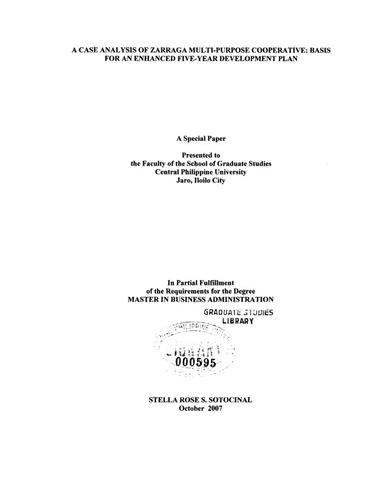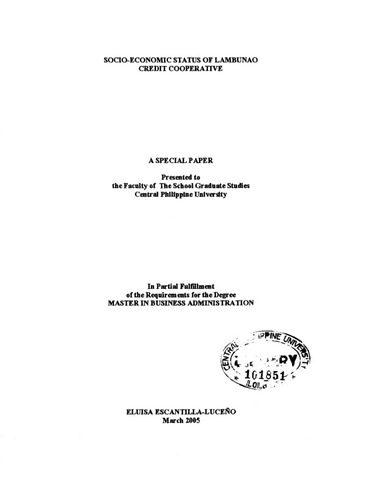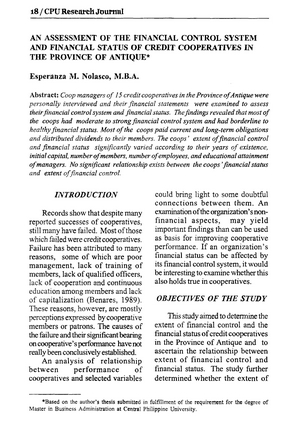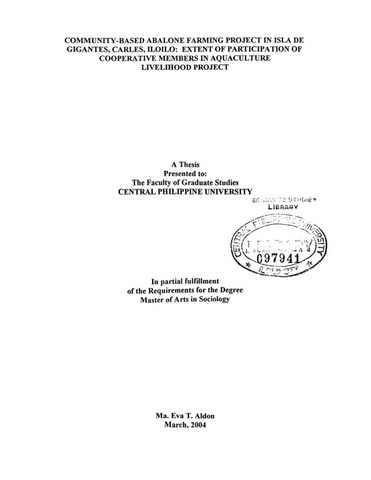A case analysis of Zarraga Multi-Purpose Cooperative: Basis for an enhanced five-year development plan

Page views
5,824Petsa
2007May-akda
Tagapayo ng Tesis
Tagapangulo ng Panel ng Depensa
Miyembro ng Defense Panel
Magbahagi
Metadata
Ipakita ang buong tala ng item
Abstract
The government estimates that 30% of Filipinos are poor. Thus, it encourages economic activities in the countryside. Cooperatives are organizations that provide people with common interest the means to produce goods and service from which money are received in return. However, according to CDA Monitoring Statistics for Region VI as of December 2006 only 29% of the 5,431 cooperatives registered since 1991 are still operating today. In Zarraga alone, of the two farmers’ cooperative organized since the 80s, only one is still operational right now, the Zarraga Multi Purpose Cooperative (ZMPC). Nevertheless, ZMPC also went through losses and failures.
ZMPC was organized as a farmers’ cooperative, with assistance from DA, in 1987. It provides loan through farm inputs to its members. The coop went into crisis in 1993 when it was left on its own by the DA. Finally, in 1996 it declared bankruptcy with almost P0.7M due to LBP. The factors that contributed to its failure were: non-segregation of function of key personnel, absence of a credit committee that pre-screens applicants and failure to assemble members regularly.
In 1997, the coop was revived under new management. ZMPC’s mission is still to provide its members, who were all farmers then, access to financial and agricultural inputs. It asked for a reevaluation of credit line from LBP who in turn granted ZMPC another chance. Then it re-assessed it rooster of members of those who are still willing to give their commitment. Systems, policies and procedures were improved. Membership was expanded to include other professionals and vendors.
Today, ZMPC has a market stall, a warehouse, an office, a mechanical dryer and a delivery truck. After almost a decade of operations, ZMPC’s total assets are almost P12M from a meager P.9M in 1996. In 2005, it was awarded by the Provincial Government “Most Outstanding Cooperative-Agriculture Sector.”
Objective of the study
This study was conducted to describe and analyze the development of the Zarraga Multi-Purpose Cooperative in the last five years (2002-2006) and enhance its existing development plan for the next five years (2007 - 2011).
Specifically, this study aims to describe the members, officers and personnel of ZMPC in terms of the following personal characteristics: residence, age, gender, educational background, occupation and work experience. Determine awareness of members, officers and personnel of the vision statement, mission statement and logo of ZMPC. Describe the participation of members to the activities of the cooperative.
Describe the financial management and financial control of ZMPC. Describe the problems encountered and the solutions made by ZMPC in the last five years. Analyze and describe the financial development of ZMPC in the last five years in terms of financial ratios and percentages.
Summary of Findings
The result of the study revealed that more than 50% of respondents are residents of Zarraga. Zarraga is a farming-based municipality so it is no wonder that nearly 50% also of members are farmers. Most of these farmers have reached college or have completed their bachelor’s degrees at more than 60% combined. The mean age of respondents is 48 years. Female members are abundant at 60% more than male members at only 40%. The highest member age group is between 40 to 49 years old at nearly 30%.
Majority of respondents have read and understood the coop’s vision and mission statements. Most commendable is the 100% recognition of the coop logo. Almost all respondents said that they have attended at least one activity of the coop where majority of them have been present during annual general assemblies.
A margin of respondents also said that they transact business with the coop at least once a month with purchase of goods as the activity most frequently done. Two-thirds of respondents say that they patronize the member savings operations with 30% of them saying that they deposit and withdraw at least 3 times a year.
Significantly, 98% say that they receive annual copies of the coop’s financial statements. Members are required to put in a minimum capital-build-up (CBU) of P500. In addition, the coop has several schemes to increase member’s CBU. Thus to date, the average CBU of members is P10,834 with largest of member group having capitalization between P500-2500.
An organization that have existed for quite some time is frill of information that can provide a researcher with overflowing information that can lead to countless conclusions. However, depending on the type of information gathered and the tools used will determine the usefulness of information.
The book, Second Curve, by Ian Morrison aptly describes the direction to which ZMPC is heading. The book says that before we were in the first curve and if we don't move to the second curve, we'll be dead because the environment is changing and organizations that are not changing will have no future on this earth. The transformation effect that has been carried out has brought tremendous changes in the way we conduct our businesses internally and the way we perceive the environment around us (Morrision, 2001).
The overall financial control and measures of the coop are in place. They have books of accounts like ledgers and journals. The coop also segregate functions of key personnel like the manager, treasurer and bookkeeper. However, the coop does not have a formal procedure for the purchase and pricing of goods. Neither is the coop able to generate its own financial statements. It depends mostly on the external auditor to prepare the financial statements. This is because ZMPC does not have a formal accounting and pricing systems.
The coop’s profitability has dwindled in the last three years. It reached its peak in 2003 with a net income per common stock of P24.64 to a low in 2006 of P3.06. This may be attributed to the increase in the acquisition of capital investments in the last three years that have also increase depreciation and financing costs. However, gross profit ratio had shown also a downfall from a high of 7.60% in 2003 to a low of 2.89% in 2006. Of the major economic activities of ZMPC, the loan windows have proven to be more profitable than its merchandising activities. The former has shown a steady rise over the years while the latter has experienced a decreasing trend.
ZMPC’s ideal liquidity ratio is 1.5 current assets to every 1 current liabilities. In last five years, it was only in 2002 where the coop had attained its ideal ratio at 1.93:1 and the most undesirable in 2005 at 1.16.1.
In terms of stability, the coop has shown a slight increase in debt ratio. The lowest in 2002 had shown that for every Pl asset the coop has a P0.67 liability. The coop’s capacity to meet its interest when they fall due has tremendously declined to only 0.58 times in 2006 from a high of 5.71 times in 2003.
Recommendations
The coop has an existing 10 year development plan with the remaining years covering 2007 to 2011. An enhancement of the existing development was arrived at with the following suggested highlights: (1) the coop must install a formal pricing system, (2) attendance to trainings on installation of accounting system, product pricing and property valuation, (3) encourage volunteer members, (4) maintain one hundred percent repayment and one hundred percent MIGS of personnel and officers, (5) intensify usage of mechanical dryer, (6) provide technology trainings on rice and other high value crops, and (7) improve its financial ratios, the last being dependent on the implementation of the other suggestions.
Paglalarawan
Abstract only
Mungkahing Sipi
Sotocinal, S. R. S. (2007). A case analysis of Zarraga Multi-Purpose Cooperative: Basis for an enhanced five-year development plan (Unpublished Master's special paper). Central Philippine University, Jaro, Iloilo City.
Uri
Special paperMga Paksa
Mga keyword
Kagawaran
School of Graduate StudiesDegree
Master in Business AdministrationLokasyon ng Istante
GSL Theses 650.072 So72
Pisikal na paglalarawan
xiv, 122 leaves
Collections
Ang mga sumusunod na mga file ng lisensya ay naiugnay sa item na ito:
Maliban kung sa kabilang banda ay nabanggit, ang lisensya ng item na ito ay inilarawan bilangAttribution-NonCommercial-NoDerivs 3.0 Philippines
Mga parehong item
Ipinapakita ang mga item na nauugnay sa pamagat, may-akda, tagalikha at paksa.
-
Socio-economic status of Lambunao Credit Cooperative
Luceño, Eluisa E. (2005)The study was conducted to determine the Socio-Economic Status of Lambunao Credit Cooperative. The study involves members of Lambunao Credit Cooperative. Questionnaires were used in gathering the data that were made solely ... -
An assessment of the financial control system and financial status of credit cooperatives in the Province of Antique
Nolasco, Esperanza M. (Central Philippine University, 1999)Coop managers of 15 credit cooperatives in the Province of Antique were personally interviewed and their financial statements were examined to assess their financial control system and financial status. The findings revealed ... -
Community-based abalone farming project in Isla de Gigantes, Carles, Iloilo: Extent of participation of cooperative members in aquaculture livelihood project
Aldon, Ma. Eva T. (2004)This study determined the extent of participation of the members of a fishing cooperative in the community-based abalone farming livelihood project in Isla de Gigantes in Carles, Iloilo and the influence by the socio-demographic ...





